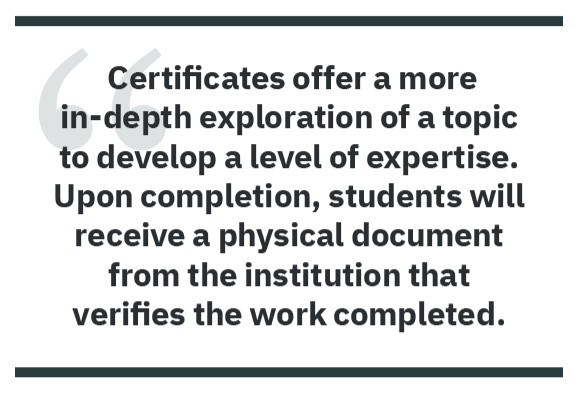By Susan M. Lang | STC Member
Professional certificates can help build your specializations within technical communication.
In the academic world, what constitutes a micro-credential can differ from institution to institution. At some institutions, certificates are considered a type of micro-credential, defined usually in comparison with minors or degrees. Other institutions see certificates as occupying some middle ground between a micro-credential awarded after completing specific activities and major and minor programs that lead to degrees.
In either case, possessing one or more academic certificates indicates that an individual has attained a particular level of competence in a specific skill set. They are offered by accredited academic institutions and may be delivered via online (synchronously or asynchronously), face-to-face, or hybrid modalities. In technical communication in the United States, approximately 100 institutions offer undergraduate certificates and approximately 40 offer graduate certificates,¹ with more in development as post-secondary institutions see certificates as a way of bringing additional audiences to an institution, including alumni, business/industry partners, and non-traditional learners who want to add skills without the time commitment of a full degree. This article will describe the value of academic certificates at both the undergraduate and graduate levels, as well as pose some of the questions to consider when deciding whether an academic certificate is a good “next step” for you.
Academic Certificates and Other Micro-credentials
What constitutes a micro-credential, a certification, and an academic certification can sometimes be confusing. All three of these categories have in common the fact that their time frames to completion are less than any post-secondary degree, whether that be an associate degree (usually requiring two years of study) or a bachelor’s degree (requiring two additional years). Any master’s level graduate degree will require at least 18–24 months beyond a bachelor’s degree to complete, while a doctoral degree will require between 3 and 6 years beyond a bachelor’s.
 Micro-credentials, whether offered by an academic institution for credit or as part of a continuing education program, may be composed of either college or professional credit courses and are usually considered as short-term training, upskilling, or re-skilling for practicing professionals in specific skill areas. Most micro-credentials are composed of two to six courses; each course may be offered with synchronous or asynchronous components and take anywhere from several weeks to several months to complete. Upon completion, students will receive a digital badge from the institution that can be added to a digital résumé or a LinkedIn profile. They may also receive continuing education units (CEUs) from the institution in lieu of college credit hours.
Micro-credentials, whether offered by an academic institution for credit or as part of a continuing education program, may be composed of either college or professional credit courses and are usually considered as short-term training, upskilling, or re-skilling for practicing professionals in specific skill areas. Most micro-credentials are composed of two to six courses; each course may be offered with synchronous or asynchronous components and take anywhere from several weeks to several months to complete. Upon completion, students will receive a digital badge from the institution that can be added to a digital résumé or a LinkedIn profile. They may also receive continuing education units (CEUs) from the institution in lieu of college credit hours.
Certificates offer a more in-depth exploration of a topic to develop a level of expertise. Upon completion, students will receive a physical document from the institution that verifies the work completed.
Undergraduate vs. Graduate Certificates
Undergraduate certificate programs can be embedded (open to students already enrolled in a degree program at an institution) or stand-alone (open to anyone outside the university who holds a high-school diploma). They may be non-credit-bearing or credit-bearing. Credit-bearing courses offered by an accredited post-secondary institution may be applied concurrently or at a later time to another academic program, such as an undergraduate major or minor, or to a graduate degree. Most credit-bearing certificates require between 9 and 15 credits (3–5 college semester courses). The length of time to complete a certificate will vary, depending on the structure of the certificate and the length of the courses offered. Certificates that require courses to be taken in a particular sequence may take between 9 and 18 months to complete, depending on the frequency of the course offerings and the length of each course. For example, some courses may be offered in more intensive, half-term lengths. In that case, it would be possible for a student to complete four courses in two semesters to obtain the certificate. Some institutions may also offer a post-bachelor’s certificate for students who wish additional credentialing. These certificates generally offer courses that would be considered upper-level undergraduate courses and require students to hold a bachelor’s degree, although not necessarily in technical communication.
Graduate certificate programs are generally credit-bearing programs that require students to meet graduate school admission requirements even if the certificate is a stand-alone one. Institutions that offer master’s or doctoral degrees in technical communication often allow students who enroll and complete a certificate to apply those credit hours to an advanced degree should they choose to continue or return to the institution to pursue one. Graduate certificate programs usually require between 12 and 18 credit hours (usually 4–6 semester courses or 3–6 quarter courses), as compared to master’s degrees, which require between 24 and 30 credits (between 8 and 15 courses, depending on whether they are semester-length or quarter-length). As with undergraduate certificates, some graduate-level certificates allow students more choice in courses while others have prescribed courses and/or sequences.
Value and Benefits
The value of any college or university credential has been debated frequently over the last 20 years as people weigh such factors as lifetime earning potential and reduction of overall income inequity against rising costs and increasing student debt.2 Knowing that the average cost of a college degree doubled between 1989 and 2016, even after adjustment for inflation, and increased at a rate eight times faster than wages, may make most people wonder if the credential is worth the cost.3 Adding to the confusion for many is the question of whether a four-year degree prepares students for a career path that may last 30 or more years. Pursuing one or more academic certificates in technical communication may provide those wishing to gain professional credentials with short-term worth while evaluating the potential longer-term gains of higher education.
At a baseline level, then, academic certificates enable students to acquire a credential from an accredited post-secondary institution without a 2–4-year time commitment necessary for an undergraduate degree, which makes this option particularly interesting to those who want to transition to a career in technical communication or to enhance existing skill sets. For those who wish to progress to a degree in technical communication, the certificate can provide a significant boost in terms of applying two or more certificate courses to a longer degree program. Completing a certificate may also assist students who did not have qualifications for admission to an academic program by providing them with credentials to apply for those programs. The development process of these certificates, which in many instances is comparable to the development of degree programs, ensures a level of quality underlying the credential. Academic institutions are often able to leverage internal and external resources in the development and implementation of programs to ensure quality. Institutions are also held to external accreditation standards regarding transparency of cost, financial aid, and applicability to other credentials or degrees. And record of each student’s completion of certificate program(s) will be verified easily by prospective or current employers.
Academic certifications may also be of particular value to: 1) students who completed bachelor’s degrees in other areas but who wish to migrate into more technical-communication-related positions; and/or 2) students who wish to test the waters before returning to a longer degree program. Completing an academic certificate will demonstrate to prospective employers that the individual possesses intellectual ability and work ethic necessary for many positions. Depending on the institution, certificate students may also have access to career services offices or other job-seeking resources. Additionally, the credibility added by possessing a credential from an accredited institution will often carry weight with employers who have hired others for various positions within their organization from that same institution. Professional networking opportunities, whether through LinkedIn or through an institution’s alumni association or other internal organizations, can also be consequences of pursing an academic certificate.
Finally, students who begin an undergraduate or graduate certificate can determine if further professional development, at either the certificating institution or another, is an avenue worth pursuing for them.
Questions to Consider
As with any professional development activity, undertaking a certificate program poses questions of paramount importance related to financial cost, time commitment, and fit. In evaluating any academic certificate program, consider the following:
- Do I have the qualifications needed to apply to/enroll in the program?
- What is the cost of the certificate? If necessary, is financial aid available through the institution or from a current employer?
- What is the time commitment, for overall completion and for each instructional component of the certificate?
- What are the short- and mid-term career benefits to acquiring the certificate?
- How does the program fit with my professional development goals?
- What is the intersection between the coursework and applied technical communication?
- Who are the instructors, and what is their experience level in the field? Do they have academic and/or industry credentials?
Conclusion
Research consistently shows that the often-debated liberal arts education versus career-focused training is a non-starter; graduates who possess a broad education that helps them develop problem-analysis and problem-solving skills along with industry-valued skills (including the ability to write, collaborate, and present material in nearly all professions) are best positioned for success. But not everyone is ready or able to dive into a first, let alone an additional, full degree commitment. Institutions that recognize this are developing other models more suited to working professionals or those seeking a career restart. Faculty at The Ohio State University are working to develop technical communication certificates that balance a refresh of writing skills with industry-specific content. These will also prepare students to take STC certification exams at the Foundation and Practitioner levels. As additional certificate programs focus on a working professional audience, more options will be available to those who wish to enter or hone their abilities as technical communicators at all levels.
References
- Melonçon, L. n.d. “Maps of TPC Programs.” Maps of TPC Programs. Accessed October 25, 2022, http://tek-ritr
.com/techcomm-programmatic-central
/maps-of-tpc-programs/. - Busteed, B. 2019. “The Convincing and Confusing Value of College Explained.” Forbes. https://www.forbes.com
/sites/brandonbusteed/2019/09/03/the-convincing-and-confusing-value-of-college-explained/. - Maldonado, C. 2018. “Price of College Increasing Almost 8 Times Faster than Wages.” Forbes. https://www
.forbes.com/sites/camilomaldonado/2018/07/24
/price-of-college-increasing-almost-8-times-faster
-than-wages/.
 SUSAN M. LANG is professor of English and the director of the Center for the Study and Teaching of Writing at The Ohio State University. She is also the editor of the Journal of Writing Analytics and reviews manuscripts for IEEE TPC. Lang teaches and researches in the areas of technical and scientific communication, writing program administration, online writing instruction, and hypertext theory. She has published in College English, Technical Communication, Journal of Technical Writing and Communication, College Composition and Communication, and Pedagogy, among others.
SUSAN M. LANG is professor of English and the director of the Center for the Study and Teaching of Writing at The Ohio State University. She is also the editor of the Journal of Writing Analytics and reviews manuscripts for IEEE TPC. Lang teaches and researches in the areas of technical and scientific communication, writing program administration, online writing instruction, and hypertext theory. She has published in College English, Technical Communication, Journal of Technical Writing and Communication, College Composition and Communication, and Pedagogy, among others.


